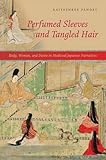Perfumed Sleeves and Tangled Hair : Body, Woman, and Desire in Medieval Japanese Narratives / Rajyashree Pandey.
Material type: TextPublisher: Honolulu : University of Hawaii Press, [2016]Copyright date: ©2016Description: 1 online resource (264 p.) : 8 b&w illustrationsContent type:
TextPublisher: Honolulu : University of Hawaii Press, [2016]Copyright date: ©2016Description: 1 online resource (264 p.) : 8 b&w illustrationsContent type: - 9780824853549
- 9780824853556
- 895.609/3561 23
- PL726.117.B63P36
- online - DeGruyter
- Issued also in print.
| Item type | Current library | Call number | URL | Status | Notes | Barcode | |
|---|---|---|---|---|---|---|---|
 eBook
eBook
|
Biblioteca "Angelicum" Pont. Univ. S.Tommaso d'Aquino Nuvola online | online - DeGruyter (Browse shelf(Opens below)) | Online access | Not for loan (Accesso limitato) | Accesso per gli utenti autorizzati / Access for authorized users | (dgr)9780824853556 |
Browsing Biblioteca "Angelicum" Pont. Univ. S.Tommaso d'Aquino shelves, Shelving location: Nuvola online Close shelf browser (Hides shelf browser)

|

|

|

|

|

|

|
||
| online - DeGruyter The White Plum : A Biography of Ume Tsuda, Pioneer of Women's Higher Education in Japan / | online - DeGruyter Unearthing the Polynesian Past : Explorations and Adventures of an Island Archaeologist / | online - DeGruyter A Garden of Marvels : Tales of Wonder from Early Medieval China / | online - DeGruyter Perfumed Sleeves and Tangled Hair : Body, Woman, and Desire in Medieval Japanese Narratives / | online - DeGruyter Network of Knowledge : Western Science and the Tokugawa Information Revolution / | online - DeGruyter Traces of the Sage : Monument, Materiality, and the First Temple of Confucius / | online - DeGruyter Exile in Colonial Asia : Kings, Convicts, Commemoration / |
Frontmatter -- Contents -- Acknowledgments -- Introduction -- CHAPTER ONE. Rethinking Body, Woman, Sex, and Agency in Medieval Japanese Narratives -- CHAPTER TWO .The Erotics of the Body in the Tale of Genji -- CHAPTER THREE .The Erotics of Power in the Tale of Genji -- CHAPTER FOUR. Woman, Love, Poetry, and Enlightenment Izumi Shikibu as Topos -- CHAPTER FIVE. "Meditating on the Impure Body" The Generic Transformations of a Medieval Topos -- Epilogue -- Notes -- Bibliography -- Index -- About the Author
restricted access online access with authorization star
http://purl.org/coar/access_right/c_16ec
Perfumed Sleeves and Tangled Hair explores the possibilities and limits of terms such as "body," "woman," "gender," and "agency"-categories that emerged within the context of western philosophical, religious, and feminist debates-to analyze texts that come out of altogether different temporal and cultural contexts. Through close textual readings of a wide range of classical and medieval narratives, from well-known works such as the Tale of Genji to popular Buddhist tales, Rajyashree Pandey offers new ways of understanding such terms within the context of medieval Buddhist knowledge. Pandey suggests that "woman" in medieval Japanese narratives does not constitute a self-evident and distinct category, and that there is little in these works to indicate that the sexed body was the single most important and overarching site of difference between men and women. She argues that the body in classical and medieval texts is not understood as something constituted through flesh, blood, and bones, or as divorced from the mind, and that in the Tale of Genji it becomes intelligible not as an anatomical entity but rather as something apprehended through robes and hair. Pandey provocatively claims that "woman" is a fluid and malleable category, one that often functions as a topos or figural site for staging debates not about real life women, but rather about delusion, attachment, and enlightenment, issues of the utmost importance to the Buddhist medieval world.Pandey's book challenges many of the assumptions that have become commonplace in academic writings on women and Buddhism in medieval Japan. She questions the validity of speaking of Buddhism's misogyny, women's oppression, passivity, or proto-feminism, and points to the anachronistic readings that result when fundamentally modern questions and concerns are transposed unreflexively onto medieval Japanese texts. Taking a broad, interdisciplinary approach, and engaging widely with literature, religious studies, and feminism, while paying close attention to medieval texts and genres, Pandey boldly throws down the gauntlet, challenging some of the sacred cows of contemporary scholarship on medieval Japanese women and Buddhism.
Issued also in print.
Mode of access: Internet via World Wide Web.
In English.
Description based on online resource; title from PDF title page (publisher's Web site, viewed 29. Jul 2021)


